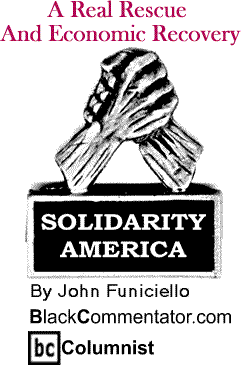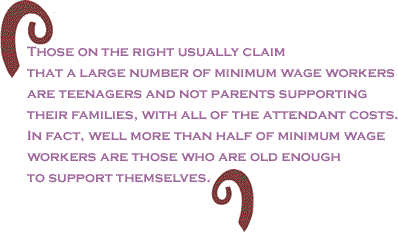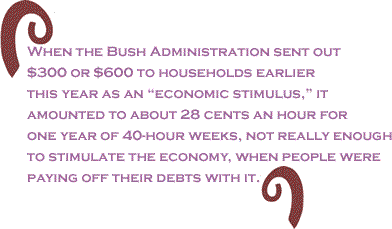
|
|||||||||||||||||||||||

|
|

Custom Search
|
|
 |
|
| It’s clear now that the bailout of the large financial institutions of Wall Street and the people who led them into trouble is not going to do very much to help the average worker survive in an economy that’s growing more hostile to them with each passing year. What the bailout of Treasury Secretary Henry Paulson Jr. and his boss, George W. Bush is doing is saving the hides of the former Wall Street colleagues of Paulson and their companies—and hoping that some of it will trickle down to the people. Experience tells us that, from Ronald Reagan until today, this kind of economic theory doesn’t work, but that never stops politicians from telling us that it will. And, they expect us to believe it. Enough Americans believe it and are willing to tighten their belts another notch, in the hope that prosperity is just around the corner and they’ll soon have to let those belts out a notch or two. There are ways to get the money into the economy and to put the equivalent of the bailout, $1 trillion dollars (so far), into the economy in the most effective way would be to put it into the hands of the people. Most of them would put the money into their communities immediately. There are other ways to generate that kind of money, and more. Fifteen years ago, a group of workers and their supporters went to the labor commissioner of New York State and asked that he recognize that the minimum wage was not high enough for people to live decently. In New York, the commissioner can raise the minimum wage administratively when it is not sufficient. Since this is a hot rail issue for conservatives, especially if the increase didn’t go through the legislative process, the commissioner said that a study would be done, and the wait began. Needless to say, the minimum wage never was raised administratively and it took years for it to reach the current $7.15 an hour, a little higher than the federal minimum. As in most of the country, the minimum wage stayed at $5.15 an hour for 10 years. It rose to $7.15 last August and will rise to $7.25 an hour in August, 2009. What was learned from that experience—stretched out over two administrations—was that the people who run the economy will go to any length to keep the minimum wage as low as possible, regardless of the political affiliation of the executive or the majority of the legislative branch. Many on the right would eliminate the minimum wage altogether. But, at the time, a modest raise in the minimum wage would have put some $3 billion into the state’s economy every year. That was about equal to the amount of economic activity generated by New York’s agriculture and not far behind another important segment of the economy, tourism. A $2 raise in the current minimum would pump more than $7 billion into the state’s economy—just from the increase. Those on the right usually claim that a large number of minimum wage workers are teenagers and not parents supporting their families, with all of the attendant costs. In fact, well more than half of minimum wage workers are those who are old enough to support themselves. About half of the 1.7 million New Yorkers working at the minimum wage are 25 or younger, and a substantial number of workers between 18 and 25 are old enough to be on their own. Conservative think tanks continue to maintain, as they have for decades, that a raise in the minimum wage hurts workers. They must be the only ones in the world who believe that a pay raise is not good for workers. But they keep saying it, pointing out that, with all of the programs available to low-wage workers, in some states they can double their annual income. Obviously, pundits in their ivory towers never have had to jump through those hoops and don’t know the complexity of applying for the benefits. It would be like having a second job and most don’t have the time or the wherewithal to go through the ordeal.
The point is that, if a $2 raise in the minimum wage in New York State alone would put some $7 billion into the state’s economy every year, how much would be pumped into the national economy if there were a similar increase in the federal minimum wage? $300 billion? More? When the Bush Administration sent out $300 or $600 to households earlier this year as an “economic stimulus,” it amounted to about 28 cents an hour for one year of 40-hour weeks, not really enough to stimulate the economy, when people were paying off their debts with it. It wasn’t much and likely didn’t stimulate the economy much. However, an increase in the minimum wage, to $10 or $12 an hour would put hundreds of billions of dollars into the economy and it would be spread out across the land. Just about every penny would be spent in the local communities and it would be spent right away. That’s immediate economic stimulus and the $1 trillion bailout of Wall Street would pale by comparison, because there would be no waiting for non-existent trickle-down. BlackCommentator.com Columnist John Funiciello is a labor organizer and former
union organizer. His union work started when he became a local president
of The Newspaper Guild in the early 1970s. He was a reporter for
14 years for newspapers in |
|
Any BlackCommentator.com article may be re-printed so long as it is re-printed in its entirety and full credit given to the author and www.BlackCommentator.com. If the re-print is on the Internet we additionally request a link back to the original piece on our Website. Your comments are always welcome. eMail re-print notice
If you send us an eMail message we may publish all or part of it, unless you tell us it is not for publication. You may also request that we withhold your name. Thank you very much for your readership. |
|
| |
|
| October 16, 2008 Issue 295 |
|
| Executive Editor: Bill Fletcher, Jr. |
| Managing Editor: Nancy Littlefield |
| Publisher: Peter Gamble |
| Est. April 5, 2002 |
Printer Friendly Version
in resizeable plain
text format or pdf
format. |
| Frequently Asked Questions |
 |

|
 |
 |
 |
| |
| |




































